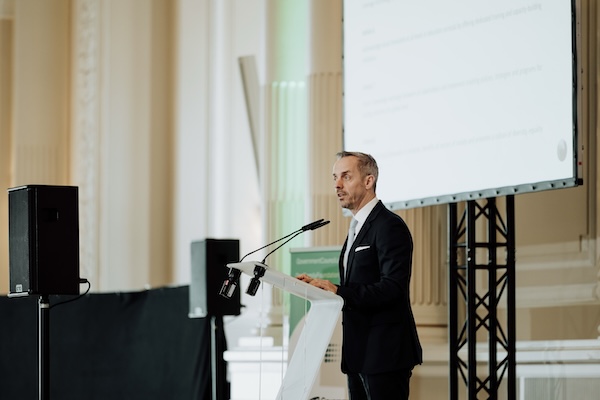 Minister Georges Mischo;
Credit: Ministry of Labour (MT)
Minister Georges Mischo;
Credit: Ministry of Labour (MT)
On Monday 14 April 2025, Luxembourg's Ministry of Labour reported on the 1st Global Government Summit which was held in Luxembourg-Kirchberg and was dedicated to social innovation and attended by Minister Georges Mischo representing Luxembourg.
At the official opening ceremony, Minister Mischo emphasised the need for governments around the world to strengthen cooperation and coordinate their efforts internationally to address major contemporary challenges, ranging from the fight against poverty to climate change.
In video messages, Nobel Peace Prize laureate and current Prime Minister of Bangladesh, Professor Muhammad Yunus, and UN Under-Secretary-General Amina Mohammed welcomed the efforts undertaken at this summit. They emphasised that this initiative represents a significant step towards more inclusive and effective governance, based on collective action, serving people and the planet.
Minister Mischo presented an overview of the policy initiatives implemented in Luxembourg in the areas of the social economy and social innovation, thus forming part of a global transformation process.
The official creation of the Global Government Council for Social Innovation was a highlight of the meeting. This was followed by a panel featuring Rie Vejs-Kjeldgaard, Director of the Enterprise Department of the International Labour Organisation; Andriana Sukova, Vice-Rector of the Employment Department of the European Commission; Camilla Brückner, Director of the Brussels Representation of the United Nations Development Programme; and Robin Mearns, Global Director for Social Development at the World Bank.
The summit discussions focused primarily on the following topics:
Legal and strategic frameworks for better recognition of social innovation
In his speech, Minister Mischo mentioned that an overly complex regulatory framework can sometimes constitute an obstacle to the development of social innovation. The role of a government in the development of social innovation remains dependent on the context and the needs of local stakeholders. The Spanish Commissioner for Social Innovation presented the 2023-2027 strategy for the social economy.
Access to financing to maximise social impact
Moderated by a representative of the World Bank, this panel focused on the various existing financial instruments and the role that public and private stakeholders can and should play in financing social innovation. The need to engage strategic partners, such as philanthropists, was also discussed.
From Data to Action and Impact Measurement
The Chair of the United Nations Task Force on the Social and Solidarity Economy, Simel Esim, took the opportunity to announce the recent establishment of a technical working group tasked with reviewing existing statistical frameworks and developing new methodologies and even classifications to improve the visibility of the social economy and social innovation, as well as understanding their impact.
The Need for Partnerships Between Public and Private Stakeholders
Several organisations involved in supporting social innovation shared their experiences of working with social entrepreneurs and innovators. They presented different approaches aimed at supporting governments in creating favourable conditions for the development of social innovation.
In his video address, the Director General of the World Intellectual Property Organization (WIPO), Dr. Daren Tang, congratulated Minister Mischo for organising such an unprecedented summit. He highlighted the importance of new partnerships and reaffirmed his commitment to social entrepreneurs, who face numerous challenges.
Discussions continued on ways in which governments can leverage existing multilateral frameworks, such as the G20, the COP and the United Nations General Assembly, to strengthen the recognition and integration of social innovation into international public policies.
Through bilateral meetings and numerous informal exchanges, participants explored avenues for collaboration in response to common challenges encountered at various regional and continental levels.
The summit concluded with the adoption of the "Luxembourg Declaration," which summarises the collectively defined priorities to guide future actions in social innovation. Seventeen countries, representing various regions of the world, expressed their willingness to commit to concrete measures to support social innovators, facilitate their access to financing, and promote coherent public policies guided by shared objectives.
For details, see https://globalgovsummit.lu.








